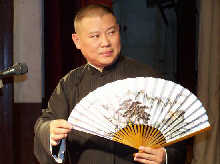 Tong and Ma have performed a number of works posted on the Internet by amateur writers. Most of them are about contemporary life, such as "Western Food" and "Artificial Beauty." After Tong and Ma's amendments, some of these works have been welcomed by the audience and have become part of the duo's standard repertory.
Tong and Ma have performed a number of works posted on the Internet by amateur writers. Most of them are about contemporary life, such as "Western Food" and "Artificial Beauty." After Tong and Ma's amendments, some of these works have been welcomed by the audience and have become part of the duo's standard repertory.
Offering new works is not the Internet's only contribution to xiangsheng. Ma said he had benefited more from the Internet. "The Internet provides substantial information, which helps me greatly in researching and writing works," said Ma. "Sometimes I also post my recordings on the Internet for netizens to comment on, so that I can keep improving."
Now the Haha Xiao group gives 13 performances in teahouses every week, which tops all the folk talk show groups in Tianjin. "Among theaters, teahouses, and the TV, I like to perform in teahouses the most," said Ma. "The close distance between the performers and audience provides much room for interaction, and the performers can improvise sometimes according to the situation."
 Fall and rise of comic talk
Fall and rise of comic talk
Xiangsheng originated in Beijing in the second half of the 19th century, when the performers began to appear and attract audiences at Beijing's Tianqiao area. Usually only two people perform xiangsheng, though sometimes one person or even a trio can perform it.
Beijing and Tianjin have been the two most important bases for the show. Beijing has given birth to such great performers as Hou Baolin(1917-1993), while Tianjin has contributed masters like Ma Sanli(1914-2003).
In the first half of the 20th century, xiangsheng was mainly performed in teahouses. After the founding of New China in 1949, most of the comedians were recruited into State-run performing arts troupes, and comic talk shows in teahouses gradually disappeared.
However, with teahouses mushrooming in recent years, there has been a revival.
